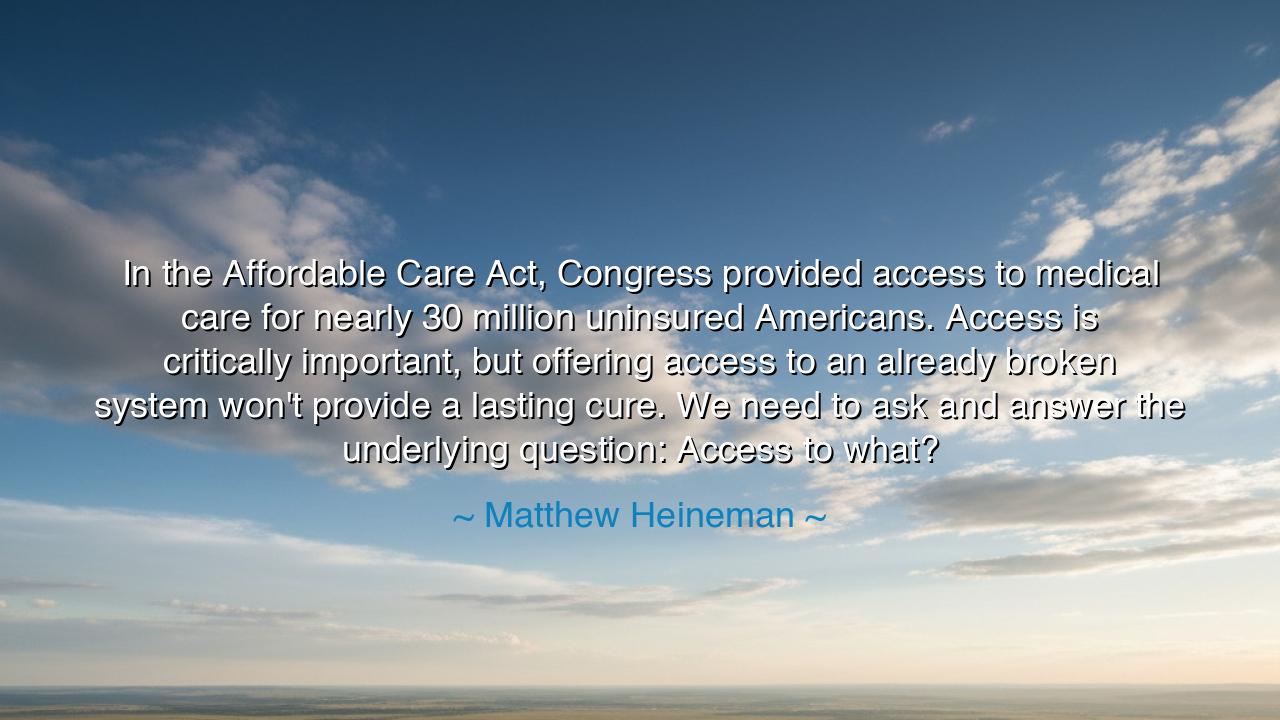
In the Affordable Care Act, Congress provided access to medical
In the Affordable Care Act, Congress provided access to medical care for nearly 30 million uninsured Americans. Access is critically important, but offering access to an already broken system won't provide a lasting cure. We need to ask and answer the underlying question: Access to what?






Hear now the words of Matthew Heineman, whose voice pierces through the clamor of policy and law to reveal the deeper truth beneath: “In the Affordable Care Act, Congress provided access to medical care for nearly 30 million uninsured Americans. Access is critically important, but offering access to an already broken system won't provide a lasting cure. We need to ask and answer the underlying question: Access to what?” This is no idle query, but a challenge to the heart of a nation, for it forces us to look not merely at the gate, but at the house into which we are invited.
For what good is a key if it opens a crumbling door? What good is access if it leads only into halls of confusion, expense, and neglect? Heineman reminds us that true healing is not found in widening the road alone, but in ensuring that the road itself leads to a place of wholeness. To grant millions entrance into a system that is fractured, unjust, and labyrinthine is not salvation, but delay. Access without reform is like pouring water into a cracked vessel: it spills away, leaving thirst unquenched.
We must remember the lesson of the Roman aqueducts. Built with vision and strength, they carried water for centuries to millions, sustaining an empire. Yet when corruption and neglect weakened their stones, when maintenance was forgotten, the water became tainted, and cities grew sick though the channels remained. The people still had access to water, but what they drank no longer gave life. So too with health: it is not the opening of gates alone, but the purity and strength of what lies beyond them that determines whether people flourish or fall.
Heineman’s question—“Access to what?”—is therefore both practical and moral. It urges us to look past numbers and statistics, past the boast of millions newly covered, and to ask whether the care itself is worthy. Is it swift? Is it affordable? Is it compassionate? Or does it entangle the sick in bureaucracy, drown them in debt, and leave them gasping for breath though they sit in the doctor’s chair? The truest measure of a system is not in how many it admits, but in how many it heals.
There is a quiet heroism in those who have seen this truth firsthand. Consider the tale of Dr. Paul Farmer, who walked among the poor of Haiti, bringing not only medicine but dignity. He saw that access meant little if the clinics were bare, if the treatments were unaffordable, if the system itself crushed hope. His work reminds us that health is not only a technical service, but a covenant between human beings—a sacred pact to preserve life with honor.
Thus, the lesson for us is clear: let us not be content with the widening of doors. Let us demand that the system into which we walk be reformed, strengthened, and made just. To every citizen falls the duty to question, to speak, to press leaders not only to provide access, but to transform the very heart of care. Without such vigilance, we will find ourselves wandering within walls that appear vast yet hollow, where healing is promised but rarely delivered.
And so I say to you, seekers of justice and health: do not be lulled into quiet acceptance. Ask always: Access to what? Ask it of your leaders, of your communities, even of yourselves. Support not only the granting of coverage, but the building of systems that are whole, humane, and sustainable. For in this way, we honor the true spirit of healing—where care is not a privilege, nor a maze, but a birthright of every soul.
Heineman’s words, spoken in our time, shall endure like a warning carved in stone: that a door without a worthy dwelling is no refuge, and a path without a destination is no journey. Let us labor, then, not only to open the gates of health, but to rebuild the house within, so that when the multitudes enter, they find not ruin, but renewal. This is the wisdom passed down; this is the charge laid before us.






AAdministratorAdministrator
Welcome, honored guests. Please leave a comment, we will respond soon